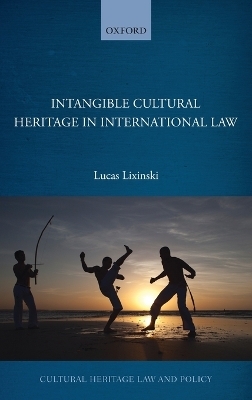
Intangible Cultural Heritage in International Law
Oxford University Press (Verlag)
978-0-19-967950-8 (ISBN)
This book offers a comprehensive analysis of the legal issues around intangible cultural heritage (also known as traditional cultural expressions or folklore). It explores both institutional and substantive responses the law offers to the safeguarding of intangible heritage, relying heavily on critiques internal and external to the law. These external critiques primarily come from the disciplines of anthropology and heritage studies.
Intangible cultural heritage is safeguarded on three different levels: international, regional, and national. At the international level, the foremost instrument is the specific UNESCO Convention for the Safeguarding of the Intangible Cultural Heritage (2003). At the regional level, initiatives are undertaken both in schemes of political and economic integration, a common thread being that intangible cultural heritage helps promote a common identity for the region, becoming thus a desirable aspect of the integration process. Domestically, responses range from strong constitutional forms of protection to rather weak policy initiatives aimed primarily at attracting foreign aid.
Intangible heritage can also be safeguarded via substantive law, and, in this respect, the book looks at the potential and pitfalls of human rights law, intellectual property tools, and contractual approaches. It investigates how the law works and ought to work towards protecting communities, defined as those from where intangible cultural heritage stems, and to whom benefits of its exploitation must return. The book takes the critiques from anthropological and heritage studies into account in order to posit a re-shaped law, offering tools that can be valuable to both scholars and practitioners when understanding how to safeguard intangible heritage.
Dr Lucas Lixinski is Lecturer at the University of New South Wales Faculty of Law (Sydney, Australia). He holds a PhD in International Law from the European University Institute (Florence, Italy). He researches and writes primarily in the areas of international cultural heritage law and international human rights law. He is Brazilian, and received his first law degree from the Universidade Federal do Rio Grande do Sul (Porto Alegre, Brazil).
1. Introduction ; PART I - INSTITUTIONAL RESPONSES ; 2. International Framework ; 3. Regional Responses ; 4. National Responses ; PART II - SUBSTANTIVE MEASURES TO SAFEGUARD INTANGIBLE HERITAGE ; 5. International Human Rights and Intangible Cultural Heritage ; 6. Intellectual Property and Intangible Heritage ; 7. Contractual Approaches ; 8. Conclusions
| Erscheint lt. Verlag | 13.6.2013 |
|---|---|
| Reihe/Serie | Cultural Heritage Law And Policy |
| Verlagsort | Oxford |
| Sprache | englisch |
| Maße | 162 x 237 mm |
| Gewicht | 596 g |
| Themenwelt | Recht / Steuern ► EU / Internationales Recht |
| Recht / Steuern ► Öffentliches Recht ► Völkerrecht | |
| Sozialwissenschaften ► Ethnologie | |
| Sozialwissenschaften ► Soziologie | |
| ISBN-10 | 0-19-967950-9 / 0199679509 |
| ISBN-13 | 978-0-19-967950-8 / 9780199679508 |
| Zustand | Neuware |
| Informationen gemäß Produktsicherheitsverordnung (GPSR) | |
| Haben Sie eine Frage zum Produkt? |
aus dem Bereich


